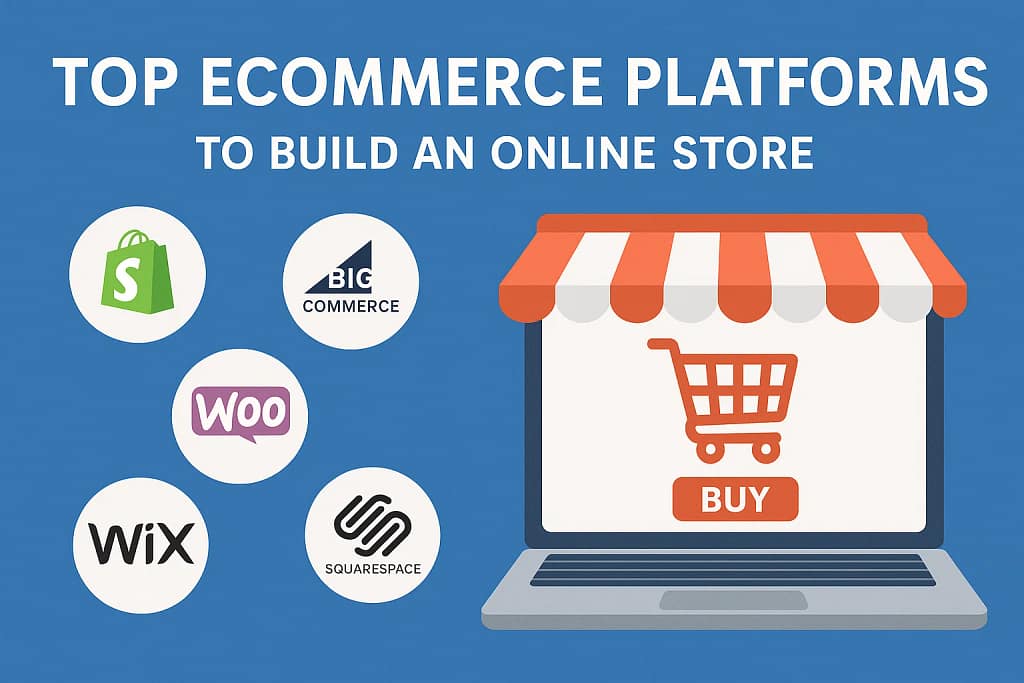The digital marketplace is more competitive than ever in 2025. Whether you’re starting a new business or scaling an existing one, choosing the right eCommerce platform is crucial. It determines your store’s flexibility, user experience, scalability, and overall success. With so many options available, it can be overwhelming to pick the best online store builder that fits your needs.
In this guide, we’ll explore the top 10 eCommerce platforms to build a powerful and profitable online store in 2025. We’ll also look at important features, pros and cons, and which platform suits different business sizes and industries.
Factors to Consider When Choosing an eCommerce Platform
Before diving into the list, here are key aspects you should evaluate when selecting a eCommerce platform:
- Ease of Use: Can you build and manage the store without needing to code?
- Customization Options: How flexible is the design and functionality?
- SEO & Marketing Tools: Are there built-in tools for search engine optimization, email marketing, etc.?
- Mobile Responsiveness: Does your digital storefront look great on smartphones and tablets?
- Payment Gateway Integration: Does the platform support your preferred payment providers?
- Scalability: Can it grow with your business?
- Customer Support: Is reliable help available when you need it?
- Cost: Are the pricing plans suitable for your budget?
Top 10 eCommerce Platforms for 2025
1. Shopify
Best for: Beginners to large enterprises
Shopify continues to dominate the market as one of the most popular eCommerce platforms globally. It’s an all-in-one shopping cart software that simplifies online store creation and management.
Key Features:
- Drag-and-drop store builder.
- 8,000+ apps for additional features
- Built-in analytics and SEO tools
- Secure payment gateway (Shopify Payments)
Pros:
✔ Easy to use
✔ Beautiful, responsive themes
✔ 24/7 customer support
Cons:
✘ Monthly fees can add up with apps
✘ Limited customization without coding
2. WooCommerce (WordPress Plugin)
Best for: WordPress users who want full control
WooCommerce is a free, open-source eCommerce website builder that transforms your WordPress site into a fully functioning store.
Key Features:
- Total design flexibility
- Extensive plugin support
- Built-in blogging for content marketing
Pros:
✔ No subscription fees
✔ SEO-friendly
✔ Highly customizable
Cons:
✘ Requires some technical knowledge
✘ Hosting and security are your responsibility
3. BigCommerce
Best for: Fast-growing businesses and brands
BigCommerce is a robust cloud-based eCommerce platform built for scalability and performance.
Key Features:
- Omnichannel selling (eBay, Amazon, Facebook)
- Strong B2B features
- No transaction fees
Pros:
✔ Enterprise-level functionality
✔ Built-in SEO tools
✔ Multi-currency support
Cons:
✘ Steeper learning curve
✘ Higher price tiers
4. Wix eCommerce
Best for: Small businesses and creatives
Wix combines a visual website editor with powerful online store builder tools, making it ideal for non-tech users.
Key Features:
- Intuitive drag-and-drop interface
- Customizable templates
- Mobile-optimized designs
Pros:
✔ Very easy to set up
✔ Affordable pricing plans
✔ Great for showcasing products visually
Cons:
✘ Limited scalability for larger stores
✘ Not ideal for complex inventories
5. Squarespace Commerce
Best for: Design-focused brands
Known for stunning design templates, Squarespace is a go-to eCommerce platform for artists, photographers, and fashion businesses.
Key Features:
- Beautiful responsive templates
- Inventory and order management
- Email marketing integration
Pros:
✔ Visually appealing layouts
✔ All-in-one solution
✔ Solid performance
Cons:
✘ Less flexible than others
✘ Limited payment gateways
6. Magento (Adobe Commerce)
Best for: Large enterprises with technical resources
Magento, now Adobe Commerce, is a powerful, open-source eCommerce platform built for performance and scale.
Key Features:
- Advanced product management
- Customizable checkout process
- Robust API and third-party integrations
Pros:
✔ Extremely flexible
✔ Scalable for large inventories
✔ Strong community support
Cons:
✘ Complex to set up and maintain
✘ Expensive for hosted (Adobe) version
7. Shift4Shop (formerly 3dcart)
Best for: Feature-rich startups
Shift4Shop is a cloud-based shopping cart solution offering many built-in tools without the need for third-party apps.
Key Features:
- Free plan with no transaction fees
- Built-in SEO optimization
- Real-time shipping calculators
Pros:
✔ No hidden costs
✔ Strong for SEO
✔ Advanced reporting tools
Cons:
✘ Design templates feel dated
✘ Limited design flexibility
8. Ecwid
Best for: Sellers who want to add eCommerce to an existing site
Ecwid allows you to embed a store on your website, blog, or social media page.
Key Features:
- Seamless integration with any CMS
- Sync across Instagram, Facebook, and marketplaces
- Free tier available
Pros:
✔ Easy setup
✔ Great for multichannel sales
✔ Affordable
Cons:
✘ Limited features compared to full platforms
✘ Less control over design
9. PrestaShop
Best for: Developers and international sellers
PrestaShop is another free, open-source eCommerce platform that offers a high degree of customization.
Key Features:
- Multilingual and multi-currency support
- 3,000+ modules and templates
- Community-driven development
Pros:
✔ No monthly fees
✔ Strong international capabilities
✔ Developer-friendly
Cons:
✘ Hosting and maintenance required
✘ Limited official support
10. OpenCart
Best for: Budget-conscious sellers with tech skills
OpenCart is a free and lightweight eCommerce solution that’s great for small businesses that want more control over their site.
Key Features:
- Unlimited product listing
- Built-in affiliate and discount systems
- Wide range of extensions
Pros:
✔ Completely free
✔ Simple admin dashboard
✔ Developer-friendly
Cons:
✘ Less intuitive interface
✘ Paid extensions needed for advanced features
Final Thoughts
Choosing the right eCommerce platform in 2025 is more than just picking a popular name—it’s about aligning with your business goals, technical skills, and growth plans. Whether you’re launching a niche boutique or scaling an international brand, there’s a platform designed to support your journey.
If you’re just starting, software platforms like Shopify, Wix, or WooCommerce are excellent choices. For growing enterprises, BigCommerce or Magento might be a better fit.

